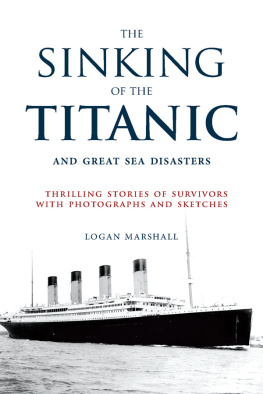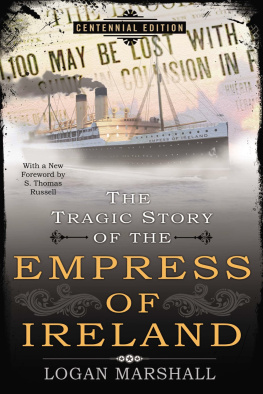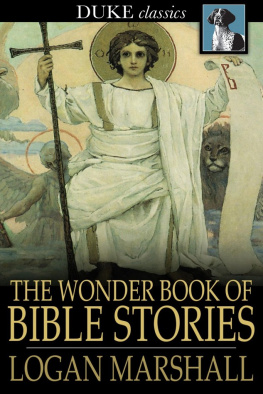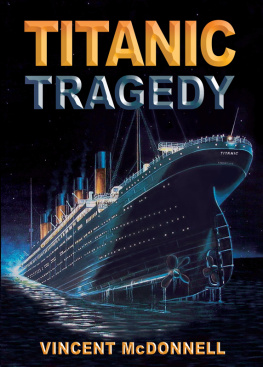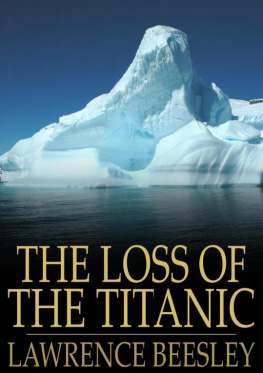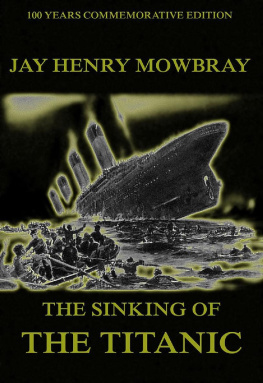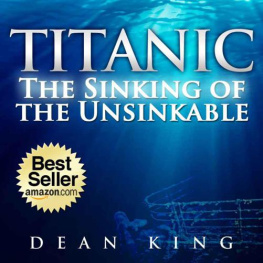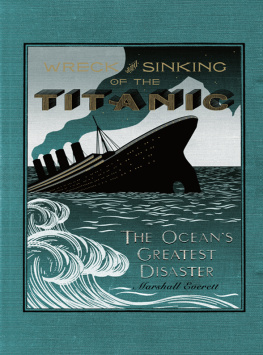Logan Marshall - Sinking of the Titanic and Great Sea Disasters
Here you can read online Logan Marshall - Sinking of the Titanic and Great Sea Disasters full text of the book (entire story) in english for free. Download pdf and epub, get meaning, cover and reviews about this ebook. year: 1912, genre: Non-fiction. Description of the work, (preface) as well as reviews are available. Best literature library LitArk.com created for fans of good reading and offers a wide selection of genres:
Romance novel
Science fiction
Adventure
Detective
Science
History
Home and family
Prose
Art
Politics
Computer
Non-fiction
Religion
Business
Children
Humor
Choose a favorite category and find really read worthwhile books. Enjoy immersion in the world of imagination, feel the emotions of the characters or learn something new for yourself, make an fascinating discovery.
- Book:Sinking of the Titanic and Great Sea Disasters
- Author:
- Genre:
- Year:1912
- Rating:3 / 5
- Favourites:Add to favourites
- Your mark:
- 60
- 1
- 2
- 3
- 4
- 5
Sinking of the Titanic and Great Sea Disasters: summary, description and annotation
We offer to read an annotation, description, summary or preface (depends on what the author of the book "Sinking of the Titanic and Great Sea Disasters" wrote himself). If you haven't found the necessary information about the book — write in the comments, we will try to find it.
Sinking of the Titanic and Great Sea Disasters — read online for free the complete book (whole text) full work
Below is the text of the book, divided by pages. System saving the place of the last page read, allows you to conveniently read the book "Sinking of the Titanic and Great Sea Disasters" online for free, without having to search again every time where you left off. Put a bookmark, and you can go to the page where you finished reading at any time.
Font size:
Interval:
Bookmark:
SINKING OF THE TITANIC
AND GREAT SEA DISASTERS
By Various
Edited by Logan Marshall
Pre-Frontispiece Caption: THE TITANIC
The largest and finest steamship in the world; on her maiden voyage, loaded with a human freight of over 2,300 souls, she collided with a huge iceberg 600 miles southeast of Halifax, at 11.40 P.M. Sunday April 14, 1912, and sank two and a half hours later, carrying over 1,600 of her passengers and crew with her.
Frontispiece Caption: CAPTAIN E. J. SMITH
Of the ill-fated giant of the sea; a brave and seasoned commander who was carried to his death with his last and greatest ship.
Sinking of the Titanic and Great Sea Disasters
A Detailed and Accurate Account of the Most Awful Marine Disaster in History, Constructed from the Real Facts as Obtained from Those on Board Who Survived.
ONLY AUTHORITATIVE BOOKINCLUDING Records of Previous Great Disasters of the Sea, Descriptions of the Developments of Safety and Life-saving Appliances, a Plain Statement of the Causes of Such Catastrophes and How to Avoid Them, the Marvelous Development of Shipbuilding, etc.
With a Message of Spiritual Consolation by REV. HENRY VAN DYKE, D.D.
EDITED BY LOGAN MARSHALLAuthor of Life of Theodore Roosevelt, etc.
ILLUSTRATED With Numerous Authentic Photographs and Drawings
Dedication
To the 1635 souls who were lost with the ill-fated Titanic, and especially to those heroic men, who, instead of trying to save themselves, stood aside that women and children might have their chance; of each of them let it be written, as it was written of a Greater One"He Died that Others might Live
I stood in unimaginable trance
And agony that cannot be remembered.
Dr. Van Dykes Spiritual Consolation to the Survivors of the Titanic
The Titanic, greatest of ships, has gone to her ocean grave. What has she left behind her? Think clearly.
She has left debts. Vast sums of money have been lost. Some of them are covered by insurance which will be paid. The rest is gone. All wealth is insecure.
She has left lessons. The risk of running the northern course when it is menaced by icebergs is revealed. The cruelty of sending a ship to sea without enough life-boats and life-rafts to hold her company is exhibited and underlined in black.
She has left sorrows. Hundreds of human hearts and homes are in mourning for the loss of dear companions and friends. The universal sympathy which is written in every face and heard in every voice proves that man is more than the beasts that perish. It is an evidence of the divine in humanity. Why should we care? There is no reason in the world, unless there is something in us that is different from lime and carbon and phosphorus, something that makes us mortals able to suffer together
For we have all of us an human heart.
But there is more than this harvest of debts, and lessons, and sorrows, in the tragedy of the sinking of the Titanic. There is a great ideal. It is clearly outlined and set before the mind and heart of the modern world, to approve and follow, or to despise and reject.
It is, Women and children first!
Whatever happened on that dreadful April night among the arctic ice, certainly that was the order given by the brave and steadfast captain; certainly that was the law obeyed by the men on the doomed ship. But why? There is no statute or enactment of any nation to enforce such an order. There is no trace of such a rule to be found in the history of ancient civilizations. There is no authority for it among the heathen races to-day. On a Chinese ship, if we may believe the report of an official representative, the rule would have been Men First, children next, and women last.
There is certainly no argument against this barbaric rule on physical or material grounds. On the average, a man is stronger than a woman, he is worth more than a woman, he has a longer prospect of life than a woman. There is no reason in all the range of physical and economic science, no reason in all the philosophy of the Superman, why he should give his place in the life-boat to a woman.
Where, then, does this rule which prevailed in the sinking Titanic come from? It comes from God, through the faith of Jesus of Nazareth.
It is the ideal of self-sacrifice. It is the rule that the strong ought to bear the infirmities of those that are weak. It is the divine revelation which is summed up in the words: Greater love hath no man than this, that a man lay down his life for his friends.
It needs a tragic catastrophe like the wreck of the Titanic to bring out the absolute contradiction between this ideal and all the counsels of materialism and selfish expediency.
I do not say that the germ of this ideal may not be found in other religions. I do not say that they are against it. I do not ask any man to accept my theology (which grows shorter and simpler as I grow older), unless his heart leads him to it. But this I say: The ideal that the strength of the strong is given them to protect and save the weak, the ideal which animates the rule of Women and children first, is in essential harmony with the spirit of Christ.
If what He said about our Father in Heaven is true, this ideal is supremely reasonable. Otherwise it is hard to find arguments for it. The tragedy of facts sets the question clearly before us. Think about it. Is this ideal to survive and prevail in our civilization or not?
Without it, no doubt, we may have riches and power and dominion. But what a world to live in!
Only through the belief that the strong are bound to protect and save the weak because God wills it so, can we hope to keep self-sacrifice, and love, and heroism, and all the things that make us glad to live and not afraid to die.
HENRY VAN DYKE.
PRINCETON, N. J., April 18, 1912.
FACTS ABOUT THE WRECK OF THE TITANIC
NUMBER of persons aboard, 2340. Number of life-boats and rafts, 20. Capacity of each life-boat, 50 passengers and crew of 8. Utmost capacity of life-boats and rafts, about 1100. Number of life-boats wrecked in launching, 4. Capacity of life-boats safely launched, 928. Total number of persons taken in life-boats, 711. Number who died in life-boats, 6. Total number saved, 705. Total number of Titanics company lost, 1635.
The cause of the disaster was a collision with an iceberg in latitude 41.46 north, longitude 50.14 west. The Titanic had had repeated warnings of the presence of ice in that part of the course. Two official warnings had been received defining the position of the ice fields. It had been calculated on the Titanic that she would reach the ice fields about 11 oclock Sunday night. The collision occurred at 11.40. At that time the ship was driving at a speed of 21 to 23 knots, or about 26 miles, an hour.
There had been no details of seamen assigned to each boat.
Some of the boats left the ship without seamen enough to man the oars.
Some of the boats were not more than half full of passengers.
The boats had no provisions, some of them had no water stored, some were without sail equipment or compasses.
In some boats, which carried sails wrapped and bound, there was not a person with a knife to cut the ropes. In some boats the plugs in the bottom had been pulled out and the women passengers were compelled to thrust their hands into the holes to keep the boats from filling and sinking.
The captain, E. J. Smith, admiral of the White Star fleet, went down with his ship.
CHAPTER I. FIRST NEWS OF THE GREATEST MARINE DISASTER IN HISTORY
LIKE a bolt out of a clear sky came the wireless message on Monday, April 15, 1912, that on Sunday night the great Titanic, on her maiden voyage across the Atlantic, had struck a gigantic iceberg, but that all the passengers were saved. The ship had signaled her distress and another victory was set down to wireless. Twenty-one hundred lives saved!
Font size:
Interval:
Bookmark:
Similar books «Sinking of the Titanic and Great Sea Disasters»
Look at similar books to Sinking of the Titanic and Great Sea Disasters. We have selected literature similar in name and meaning in the hope of providing readers with more options to find new, interesting, not yet read works.
Discussion, reviews of the book Sinking of the Titanic and Great Sea Disasters and just readers' own opinions. Leave your comments, write what you think about the work, its meaning or the main characters. Specify what exactly you liked and what you didn't like, and why you think so.


